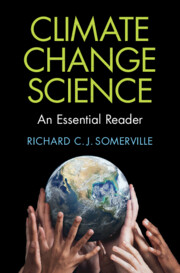Book contents
- Climate Change Science
- Reviews
- Climate Change Science
- Copyright page
- Dedication
- Epigraph
- Contents
- Preface
- Acknowledgments
- Part I Eight Articles from the Bulletin of the Atomic Scientists
- Part II Understanding and Communicating Climate Change Science
- Part III Scientific Investigations of the Climate System
- 13 The Greenhouse Effect
- 14 The Keeling Curve
- 15 The Temperature Record
- 16 Climate in the Future
- 17 Numerical Weather Prediction
- 18 Modeling the Climate System
- 19 Climate Feedbacks
- 20 Predictability
- 21 How Climate Models Work
- 22 The Sixth Assessment Report of the IPCC
- Part IV The Future
- Appendix: Curriculum Vitae of Richard C. J. Somerville
- Glossary
- Resources: Recommended Websites and Books
- References
- Index
17 - Numerical Weather Prediction
from Part III - Scientific Investigations of the Climate System
Published online by Cambridge University Press: 13 November 2025
- Climate Change Science
- Reviews
- Climate Change Science
- Copyright page
- Dedication
- Epigraph
- Contents
- Preface
- Acknowledgments
- Part I Eight Articles from the Bulletin of the Atomic Scientists
- Part II Understanding and Communicating Climate Change Science
- Part III Scientific Investigations of the Climate System
- 13 The Greenhouse Effect
- 14 The Keeling Curve
- 15 The Temperature Record
- 16 Climate in the Future
- 17 Numerical Weather Prediction
- 18 Modeling the Climate System
- 19 Climate Feedbacks
- 20 Predictability
- 21 How Climate Models Work
- 22 The Sixth Assessment Report of the IPCC
- Part IV The Future
- Appendix: Curriculum Vitae of Richard C. J. Somerville
- Glossary
- Resources: Recommended Websites and Books
- References
- Index
Summary
Lewis Fry Richardson (1881–1953) became interested in computational mathematics while the subject was still in its infancy. He was a pioneer in numerical analysis, which for our purposes means using arithmetic intelligently to find approximate solutions to mathematical problems that are too complicated to solve exactly. He tried to work out a mathematical system for predicting the weather. He started by doing theoretical meteorology, deriving equations representing the physical laws that describe the evolution of the familiar meteorological properties such as wind, temperature, pressure, and humidity. Richardson’s first numerical weather forecast, obtained after a great deal of tedious calculating, was not very accurate. In fact, it was wildly inaccurate. But Richardson was ahead of his time. He was a visionary. In the late 1940s, a team of meteorologists and mathematicians using one of the earliest computers produced the first successful numerical weather prediction. By the 1950s, routine weather forecasts were being produced by techniques based closely on Richardson’s method.
Keywords
Information
- Type
- Chapter
- Information
- Climate Change ScienceAn Essential Reader, pp. 103 - 107Publisher: Cambridge University PressPrint publication year: 2025
Accessibility standard: WCAG 2.0 A
Why this information is here
This section outlines the accessibility features of this content - including support for screen readers, full keyboard navigation and high-contrast display options. This may not be relevant for you.Accessibility Information
Content Navigation
Allows you to navigate directly to chapters, sections, or non‐text items through a linked table of contents, reducing the need for extensive scrolling.
Provides an interactive index, letting you go straight to where a term or subject appears in the text without manual searching.
Reading Order & Textual Equivalents
You will encounter all content (including footnotes, captions, etc.) in a clear, sequential flow, making it easier to follow with assistive tools like screen readers.
You get concise descriptions (for images, charts, or media clips), ensuring you do not miss crucial information when visual or audio elements are not accessible.
Structural and Technical Features
You gain clarity from ARIA (Accessible Rich Internet Applications) roles and attributes, as they help assistive technologies interpret how each part of the content functions.
